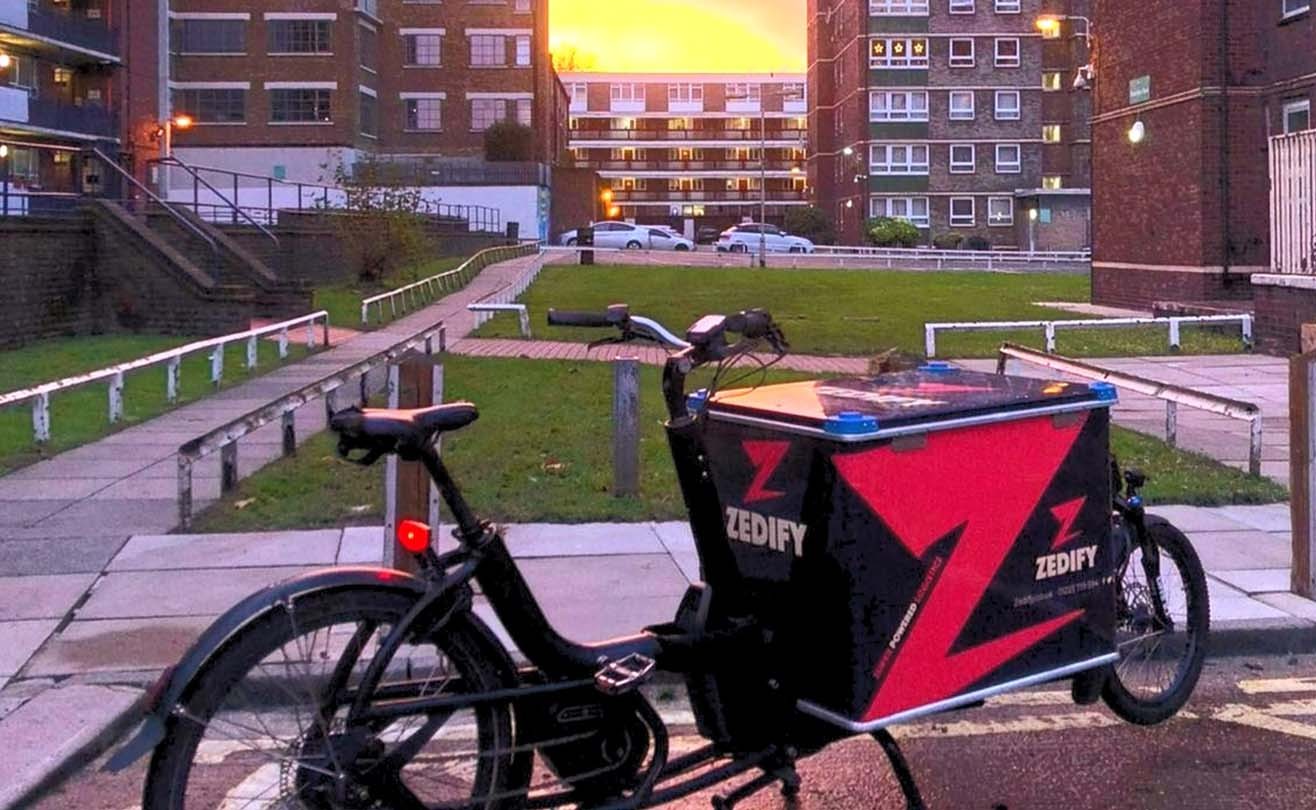
Zedifyraises£5mforUKroll-out
 March 17th, 2023
March 17th, 2023 Harriet Hird
Harriet Hird 10 minute read
10 minute readCargo bike delivery company raises £5m for UK roll-out
Zedify- the UK’s largest electric cargo bike delivery network- has secured £5m investment to expand its exceptionally low carbon service, making it available to around 20% of the UK population.
The round was led by Barclays Sustainable Impact Capital and MEIF Proof of Concept & Early Stage Fund, which is managed by Mercia and part of the Midlands Engine Investment Fund, with additional funds from original investors, Green Angel Syndicate, and new investors, Prova.
Zedify provides sustainable ‘first and last mile’ deliveries using cargo bikes in city centres, where vans can’t operate efficiently and create congestion and air pollution. Their clients include major retail brands, leading national parcel carriers and hundreds of local independent businesses across 10 UK city locations.
Research by Zedify shows that its service is over 90% lower in carbon emissions per parcel than urban deliveries by electric vans, which highlights the importance of scaling cargo bike logistics to help the UK hit its net zero targets.
Following investments totalling £1.5m by Green Angel Syndicate in 2020 and 2021 -this new round of funding will enable Zedify to open in new locations including Manchester and Birmingham, as well as scaling its tech platform, for maximum consumer and business benefits.
Our rapid and sustained shift towards online shopping has severe impacts on sustainability and service quality. Zedify is disrupting urban parcel delivery to address these pressures head on. They use ‘microhubs’ at the edge of city centres to consolidate parcels, alongside software which builds efficiency and makes for considerably better outcomes for the climate and cities, as well as exceptional experiences for consumers.
Zedify was founded in 2018 by Rob King, who had previously run a delivery business in Cambridge, and Sam Keam, who had a similar operation in Brighton. They set out to make it the ‘go-to green solution for last-mile delivery in the Uk’. The company uses only directly employed staff who are paid a real living wage and, to encourage local ownership, its network includes both depots run by Zedify and franchises.
Rob King, co-founder and CEO, said: “Zedify’s model delivers tangible benefits- significant carbon reduction in the last mile; a fairer system for workers which counteracts the gig economy; cleaner, safer deliveries that contribute to healthier, more liveable cities; and more choice for consumers about how and when they receive their parcels. It’s exciting to have the backing of new and existing investors to enable us to realise our mission to transform urban logistics and create cities that are truly better for everyone.”
Gavin Chapman, Co-Head of Principal Investments at Barclays said: “We understand that the delivery and logistics industry will require significant investment over the coming years to align with the UK’s net zero targets. Barclays are proud to support Zedify in their goal to normalise the use of hyperlocal microhubs and zero emission delivery vehicles within UK cities.”
Kiran Mehta, Investment Manager at Mercia, said: “Cargo bike delivery is a fast-growing market as councils seek to reduce congestion and pollution and consumers demand more environmentally-friendly solutions. Zedify sets itself apart from other bike delivery companies due to its unique business model and its rapid growth which has given it a ‘first mover’ advantage. The funding will enable it to make a step change in the business in the coming years.”
Mark Wilcockson, Senior Investment Manager at the British Business Bank, said: “The MEIF supports innovative business in the Midlands, with this latest investment being a great example of the funds support to promote sustainability as part of the region’s aim to reach net zero targets. This latest investment in Zedify shows how the MEIF continues to support businesses in relocating and investing into the region with new headquarters, creating wider growth for the Midlands.”
The Midlands Engine Investment Fund is supported financially by the European Union using funding from the European Regional Development Fund (ERDF) as part of the European Structural and Investment Funds Growth Programme 2014-2020 and the European Investment Bank.
ENDS
Images
https://drive.google.com/drive/folders/18DwR_S8Olv79_5bzuM7szb_3BghnL0pd?usp=sharing
Press contacts- Zedify
Harriet Hird
Head of Marketing
Zedify
07977547855
Rob King
CEO & Co-founder
07921 467 769
Press contacts – Mercia
Alison Dwyer
Head of Marketing & Communications
Mercia Asset Management PLC
+44 (0) 7464 480 137
alison.dwyer@mercia.co.uk
Pauline Rawsterne
PR Agent
Turquoise PR
+44 (0) 161 860 6063
+44 (0) 780 163 9816
pauline@turquoisepr.co.uk
Press contacts – Barclays
Holly Brown: holly.brown@barclays.com
About Zedify
Zedify delivers better cities, fit for the future. They partner with major retailers, national parcel carriers, D2C and subscription brands to transform customer experience with sustainable first and last mile deliveries.
Cargo bikes, ‘micro hubs’, and a powerful ecommerce integrated tech platform combine to create a service that is revolutionising the way parcels arrive at urban doorsteps.
Currently in 10 UK cities, London- Glasgow- Bristol- Edinburgh- Cambridge- Southampton- Brighton- Norwich- Winchester- Plymouth
Zedify- Urban deliveries done better.
About Barclays Sustainable Impact Capital
As part of the firm’s broader commitments, Barclays will invest £500m of its own capital, led by the Principal Investments team, in fast-growing, innovative, environmentally-focused companies whose values are aligned with those of Barclays and which target the goals and timelines of the Paris Agreement. Investments will be strategic to Barclays, its clients and the communities it serves, with clear scalable propositions that deliver both environmental benefits and economic returns. To find out more, click here.
About Mercia Asset Management PLC
Mercia is a proactive, specialist asset manager focused on supporting regional SMEs to achieve their growth aspirations. Mercia provides capital across its four asset classes of balance sheet, venture, private equity and debt capital: the Group’s ‘Complete Connected Capital’. The Group initially nurtures businesses via its third-party funds under management, then over time Mercia can provide further funding to the most promising companies, by deploying direct investment follow-on capital from its own balance sheet.
The Group has a strong UK footprint through its regional offices, 19 university partnerships and extensive personal networks, providing it with access to high-quality deal flow. Mercia currently has c.£800million of assets under management and, since its IPO in December 2014, has invested over £96million into its direct investment portfolio. Mercia Asset Management PLC is quoted on AIM with the epic “MERC”.
The Group raises its own Venture Capital Trusts (VCTs) and Enterprise Investment Scheme (EIS) Funds and details about open offers can be found through Mercia’s website.
Mercia Asset Management PLC is quoted on AIM with the epic “MERC” and includes the following wholly owned subsidiaries –
- Mercia Fund Management Limited is authorised and regulated by the FCA under firm reference number 524856
- Enterprise Ventures Limited is authorised and regulated by the FCA under firm reference number 183363
- EV Business Loans Limited is authorised and regulated by the FCA under firm reference number 443560
About the Midlands Engine Investment Fund (MEIF)
The Midlands Engine Investment Fund, supported by the European Regional Development Fund, will invest in Debt Finance, Small Business Loans, Proof-of-Concept and Equity Finance funds, ranging from £25,000 to £2m, specifically to help small and medium sized businesses secure the funding they need for growth and development.
The Midlands Engine Investment Fund is operated by British Business Financial Services Limited, wholly owned by British Business Bank, the UK’s national economic development bank. Established in November 2014, its mission is to make finance markets for smaller businesses work more effectively, enabling those businesses to prosper, grow and build UK economic activity.
The Midlands Engine Investment Fund is supported by the European Regional Development Fund, the European Investment Bank, the Department for Business, Energy and Industrial Strategy and British Business Finance Limited, a British Business Bank group company.
The MEIF covers the following LEP areas: Black Country, Coventry & Warwickshire, Greater Birmingham & Solihull, Stoke-on-Trent and Staffordshire, The Marches, and Worcestershire in the West Midlands; and Derby, Derbyshire, Nottingham & Nottinghamshire (D2N2) Greater Lincolnshire, Leicester and Leicestershire, and South-East Midlands in the East and South-East Midlands.
The project is receiving up to £78,550,000 of funding from the England European Regional Development Fund as part of the European Structural and Investment Funds Growth Programme 2014-2020. The programme will continue to spend to the end of 2023.
The Department for Levelling Up, Housing and Communities is the Managing Authority for European Regional Development Fund. Established by the European Union, the European Regional Development Fund helps local areas stimulate their economic development by investing in projects which will support innovation, businesses, create jobs and local community regenerations. For more information visit www.gov.uk/european-growth-funding.
The European Investment Bank is providing £122,500,000 to support the Midlands Engine Investment Fund. This follows backing for the Northern Powerhouse in 2017 and backing for the newly launched North East Fund. For further information visit www.eib.org
The funds in which Midlands Engine Investment Fund invests are open to businesses with material operations in or planning to open material operations in the West Midlands and East & South-East Midlands.
The British Business Bank has published the Business Finance Guide (in partnership with the ICAEW, and a further 21 business and finance organisations). The guide, which impartially sets out the range finance options available to businesses and provides links to support available at a regional level, is available at https://thebusinessfinanceguide.co.uk
About the British Business Bank
The British Business Bank is the UK government’s economic development bank. Established in November 2014, its mission is to make finance markets for smaller businesses work more effectively, enabling those businesses to prosper, grow and build UK economic activity. Its remit is to design, deliver and efficiently manage UK-wide smaller business access to finance programmes for the UK government.
The British Business Bank’s core programmes support nearly £8bn[1] of finance to almost 94,800 smaller businesses[2]. Since March 2020, the British Business Bank has also launched four new Coronavirus business loan schemes, delivering almost £73bn of finance to around 1.6m businesses.
As well as increasing both supply and diversity of finance for UK smaller businesses through its programmes, the Bank works to raise awareness of the finance options available to smaller businesses. The British Business Bank Finance Hub provides independent and impartial information to businesses about their finance options, featuring short films, expert guides, checklists and articles from finance providers to help make their application a success.
In light of the coronavirus pandemic and EU Exit, the Finance Hub has expanded and it now targets a wider business audience. It continues to provide information and support for scale-up, high growth and potential high growth businesses, but now provides increased content, information and products for businesses in survival and recovery mindsets. The Finance Hub has been redesigned and repositioned to reflect this, during this period of economic uncertainty.
British Business Bank plc is a public limited company registered in England and Wales, registration number 08616013, registered office at Steel City House, West Street, Sheffield, S1 2GQ. It is a development bank wholly owned by HM Government. British Business Bank plc and its subsidiaries are not banking institutions and do not operate as such. They are not authorised or regulated by the Prudential Regulation Authority (PRA) or the Financial Conduct Authority (FCA). A complete legal structure chart for the group can be found at www.british-business-bank.co.uk.
[1] Figures as at end of June 2020
[2] Figures as at 28 January 2021




